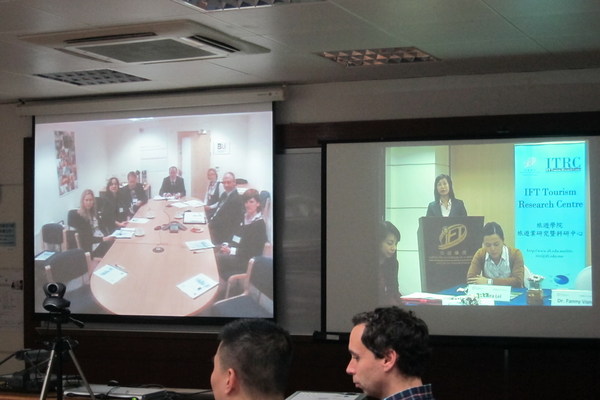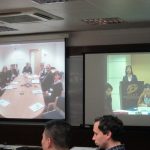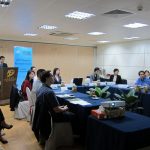
The 3rd E-Conference was held the other day by IFT Tourism Research Centre (ITRC) and Bournemouth University, UK (BU). Like Macao, the UK is facing a sudden burst of tourism growth, propelled by the coming 2012 summer Olympic games. But this and other factors have been contributing to several challenges that were appreciably similar to both destinations. Among these was an increasing polarization in the graduate workforce. The Hospitality, Leisure, Travel and Tourism sector in the UK is the third largest sector for workforce size. The introduction of tuition fee leads to increased expectations of professionalism of service delivery and standards and increased expectation of benefits of education. This was the idea behind Mr. Andrew Boer's presentation "The Polarization of the Graduate Workforce: Issues for the UK Hospitality Industry". His research reviewed some of the ways in which the higher education sector must change in order to accommodate these influences and which could result in a distinctly different style of hospitality higher education output within the next decade. Labor migration issues were also compared and discussed. Dr. Hania Janta from BU presented her research that migrant workers choose the tourism sector of employment more frequently than other low-paid sectors and this trend is likely to continue in the future. The majority of such workers are in lower paid and casual employment comprising of daily commuters and seasonal employees. Migrants' presence in this sector of employment contributes to the destination as it provides new skills, knowledge and innovation as well as a competitive advantage to many companies. On the other hand, segmentation of the labour market, perceptions and stereotyping, discrimination and underemployment makes the foreign-born workforce more vulnerable than the local one. Also, the need for migrant labours by tourism economies have many implications for destination branding, one of the examples is that people visiting Scotland are surprised to see non-Scottish people in the service industries. Speakers from IFT also highlighted similar challenges. Dr. Clara Lei of IFT focused labour shortage in Macao in which she discussed how the problem of staff turnover could be improved by employing strategic training and development programmes. She spoke on the differences between training and development programmes given by a multinational hotel and a local hotel in Macao, revealing that the multinational hotel, which had an intensive and strategic training and development programme, was able to control the turnover rate (38%) particularly within their middle-management level when compared with its local counterpart (60%). Drs. Frances Kong and Connie Loi from IFT presented a comprehensive portrait of the impact and effectiveness of supervised work experience (SWE) on the tourism and hospitality undergraduates, comparing and contrasting two different formats of SWE adopted at the Institute for Tourism Studies (IFT) in Macao. This is the third IFT-BU E-Conference, one of a series of collaborative activities between the two institutes. This year's theme was on the "Labour Issues in Tourism Economics". Previous themes were on Motorsports Research (2011) and on the Challenges of Rapid Tourism Growth (2010). Delegates and participants to the conference were welcomed by Dr. Fanny Vong, President of IFT and Richard Shipway, senior lecturer of School of Tourism, BU. The e-conference was moderated by Prof. Leonardo Dioko, the Director of ITRC on the IFT side and Mr. Andrew Boer from BU, who also gave the concluding remarks. There were about 30 staffs from IFT and BU, and 40 UK graduate students participated. The annual e-conference is jointly organized by IFT's ITRC and BU School of tourism. ITRC is a research and development unit of the IFT which serves as a management and public policy think-tank for the general public and as a knowledge provider for tourism and hospitality related research in Macao and the region. The School of Tourism at BU is a world-leader in tourism research and a leading provider of tourism management courses.
View gallery


